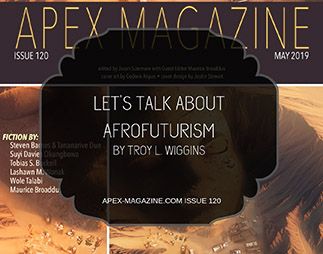
Let’s talk about Afrofuturism.
It’s been the center of much debate and conversation lately due to
the concept entering the mainstream public consciousness. This is even truer
now that Black Panther has broken all sorts of box office records.
Honestly, this an exciting time for someone like me, as I believe that
Afrofuturism is an ideology and practice that every Black person can benefit
from. And with Afrofuturism’s increased visibility has come attempts to define
it more truthfully. From these conversations, we get questions like “Who is
Afrofuturism for?” and “What can it really do for Black people?”
These are, I believe, good questions. People are using these
questions to hash out some real thoughts about exclusion, relationships between
Black people globally, and the types of futures that Black people deserve. I’m
here for many of these conversations, and I’m here for lots of these questions.
We are only going to discover our most promising futures by staying in
dialogue: dialogue with our art, with our communities, and with each other.
I am not here for anyone “owning” Afrofuturism, or staking
a dishonest claim on it, or attempting to erase its real history as a mode of
thought and creation that was born of Black American writers and thinkers.
Any conversation on Afrofuturism from an African creator or
practitioner that begins “I feel as if I/the people I identify with have been
excluded from the larger movement/definition of Afrofuturism” is valid, and
other groups of Black people should take it seriously.
Any conversation on Afrofuturism that begins “I think that one
group of Black people should be centered over another when defining
Afrofuturism or else the whole idea loses credence” is trash. Period point
blank.
One of the central tenets of Afrofuturism is that Black creators
take lessons and spiritual resolve from their past to reckon with/navigate
their present and create better futures. The idea that the work that my Black
American spiritual and literary forebears did in their private writing spaces
and with their colleagues to center, guide, and form a collective identity for
themselves as creators is wrong because it does not center Africans over other
groups of Black folks really messes with me and is a gross misrepresentation of
what they intended Afrofuturism to be, no matter what people say. History
matters. Context matters.
I’m not arguing that we’ve done this Afrofuturism thing perfectly.
Yes, the term was created by a white man, but as always, Black creators were
doing that work long before there was terminology for it. And yes, we are only
just now coming to a unified idea of what Afrofuturism is, and that has only
come through rigorous scholarship, public debate, and community practice. Yes,
there is still room to debate over a clearer, more unified idea or theory of
Afrofuturism. Yes, most of the public discourse around Afrofuturism is focused
on the Black American conception of it, and even that is changing. Afrofuturism
isn’t a locked compound, nor is it a one-size-fits-all solution to the question
of Black futures. Afrofuturism is also, on many levels, a personal practice
that individuals define for themselves as they learn more about it, because
there are as many possible futures for Black people as there are Black
people—and because we live in different places, these futures/futurisms can be
regional without competing with or blocking out other Afrofuturist ideas.
The underlying assumption in this centering argument is that Black
Americans actively try to de-center, diminish, or otherwise harm African
creators in their conceptions of Afrofuturism. A look at how Black Americans
approach Afrofuturism, within their own writing and physical communities, shows
that this is not the truth. Black American Afrofuturists respect Africa and the
connection that we have to the Continent and our ancestors there. Afrofuturism
for Black Americans has a political, ideological, and philosophical definition
that has been defined by our experiences in the United States, from beyond the
slave ship until now. Black American Afrofuturist creators have not presumed to
speak for African creators, nor have they openly called for de-centering them.
If anything, the Afrofuturist work from Black Americans has been to clearly
define what Afrofuturism means for ourselves in our own sociopolitical
realities. That should be the conversation here. Not one of de-centering and
erasure. How can anyone argue that the best course of action to creating a more
unified or inclusive definition of Afrofuturism is to diminish and eventually
remove people’s experiences and those essential spiritual connections from the
entire concept?
That argument also messes with me because it removes and
de-centers other groups of Black people. (Shout out to Caribbean writers for
always providing perspective on this that my privilege as a Black American can
cause me to miss). Centering Africans in Afrofuturism de-centers and eventually
erases entire groups of people who are neither African nor Black American in identity
or their location in physical space, people who because of their own connection
to the Africa in themselves might benefit from the lessons and ideas they might
generate from it. This take is especially unfair given than contemporary
Afrofuturist critical theorists like Reynaldo Anderson note explicitly that
contemporary Afrofuturism is Pan-African, especially so given the historical
contributions of Black Europeans and Black creators from the Caribbean to the
Afrofuturist project over the past century.
I’m not an expert in Afrofuturism. I’m not in the academy—I do community work as a day job, and my experiences there have caused me much pain and have also created in me a desire to create lasting systemic change for Black people everywhere. I’m a regular guy who writes speculative fiction because I believe that it can get us free. I’m a writer who works to create space and opportunity for Black writers everywhere, no matter who they are or where they’re from. I’m a dude who studies Afrofuturism because I see it as a liberation ideology that can create deep political and scientific agency and community shifts (and eventual transcendence, “a post-now” “future” [1 Social Text, volume 20, number 2, (71), Duke University Press https://read.dukeupress.edu/social-text/issue/20] ) among Black communities, no matter where they are. But I do know that the Afrofuturism space was intended for all Black people.
A future that is built on ignoring history, de-centering people,
and fomenting bad-faith arguments is a future using the same blueprint that has
failed us historically. And that kind of future is not one that I want to be a
part of. Nor should you.









